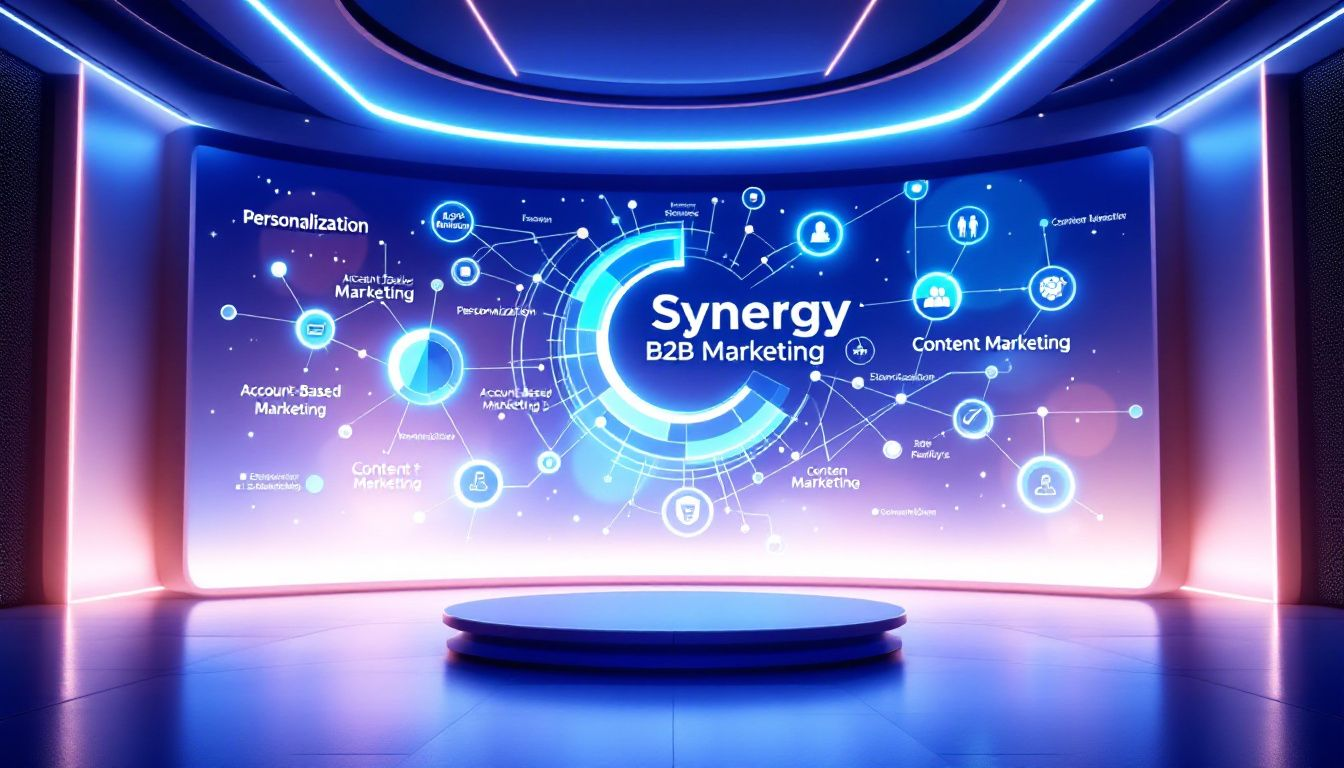B2B marketing, or business-to-business marketing, is about promoting products or services to other businesses. Effective B2B marketing is crucial for building long-term partnerships and driving growth. This article will explore what B2B marketing is, key strategies, industry trends, and successful campaign examples to help you excel.
Key Takeaways
B2B marketing focuses on building long-term relationships and understanding the buyer’s journey, which involves more complex decision-making compared to B2C marketing.
Effective B2B strategies rely on a deep understanding of target audiences, clear brand positioning, and the creation of engaging, educational content.
Digital marketing tactics such as SEO, social media, and email marketing are essential for a strong online presence, with a growing emphasis on AI and automation for improved campaign targeting and personalisation.
Understanding B2B Marketing

B2B (business-to-business) marketing is the process of marketing a product or service from one business to another, rather than to individual consumers. This type of marketing focuses on informing other businesses about products or services that can support their operations and drive their success. The scope of B2B marketing is vast, encompassing various industries such as healthcare, real estate, food services, manufacturing, and telecommunications. Whether it’s a SaaS company offering software solutions or a marketing firm, like us here at Arena Digital Marketing, providing specialised services, B2B marketing plays a pivotal role in facilitating business growth and collaboration within a business to business model.
An interesting aspect of B2B marketing is the nature of business to business transactions involved. Manufacturers, wholesalers, and retailers all engage in B2B transactions, which often involve a team or group decision-making process. For example, a wholesaler selling products to a retailer illustrates a typical B2B transaction.
Unlike consumer transactions, the B2B buyer’s journey includes stages of awareness, consideration, and decision, with buyers looking for solutions to their ongoing frustrations rather than just products. Although end consumers are not direct factors, their influence on B2B collaborations should not be underestimated.
Key Differences Between B2B and B2C Marketing
Understanding the key differences between business-to-business and business-to-consumer marketing is essential for crafting effective marketing strategies. B2B marketing targets individuals or groups within organisations who are responsible for solving company pain points, whereas B2C marketing focuses on individual consumers. This fundamental difference shapes the entire marketing approach. In B2B marketing, the purchasing decision process often involves a committee, with a 2024 Gartner Report indicating that the typical buying group for a complex B2B solution involves six to ten decision-makers, each contributing four to five independently gathered pieces of information. This results in an extended purchasing funnel compared to the typically more straightforward B2C transactions.
Another significant difference is the scale and nature of the relationships. B2B transactions often involve long-term relationships and ongoing collaborations, requiring distinct strategies and considerations such as understanding procurement needs, establishing trust, and managing the supply chain.
B2B marketplaces generally operate on a smaller scale compared to B2C markets, presenting unique challenges in adapting to the evolving buying behaviors of business customers. Recognising these key differences allows B2B companies to tailor their marketing efforts more effectively, focusing on building lasting relationships and meeting specific business needs.
Importance of B2B Marketing

B2B marketing is crucial for fostering long-term relationships, which are essential for sustainable growth. Unlike the more transactional nature of B2C purchases, B2B transactions typically aim to build lasting partnerships. Effective B2B marketing processes lead to improved client retention and higher revenue through repeat purchases. Positioning as trusted partners enhances competitive edge and drives business success.
Data-driven B2B marketing initiatives streamline operations and facilitate informed decision-making. These strategies enhance customer understanding, enabling tailored solutions that meet specific business needs. Moreover, B2B enterprises, although experiencing lower sales volumes compared to B2C businesses, tend to achieve higher profit margins.
Email marketing, for example, can yield an impressive return on investment, delivering an average ROI of $36 for every $1 spent. Continuous innovation is also vital for enhancing offerings and fostering customer loyalty.
Effective B2B Marketing Strategies
To achieve success in B2B marketing, a well-structured marketing strategy is essential. The primary goal is to attract and convert leads into customers, which requires comprehensive planning and execution.
Effective B2B marketing strategies encompass all stages of the buyer’s journey, from awareness to decision, and involve both inbound and outbound marketing efforts. Experimentation and A/B testing are also critical components for refining these strategies.
Defining Your Brand Positioning
Defining your brand positioning is a crucial step in developing an effective marketing strategy. It involves understanding your product’s unique value proposition and what sets it apart from competitors. Clear brand positioning helps communicate the benefits of your products or services to your target market and ensures that your offerings are perceived as the best solution for their needs.
When establishing brand positioning, it’s important to consider elements such as target market, product or service category, and the specific value differentiators you offer – why should a prospect choose you? This clarity not only helps in attracting the right customers but also in creating a cohesive brand image that resonates with your audience.
Successful B2B brand positioning requires a deep understanding of your market and the ability to articulate your value proposition effectively.
Understanding Your Target Audience
Knowing your target audience inside out is fundamental to any successful B2B marketing strategy. Detailed knowledge of customers’ business structures and decision-makers is vital for tailoring marketing efforts effectively. One common challenge for B2B marketers is locating suitable businesses to which they can sell their products and services. Actively researching your audience and seeking client feedback through surveys can guide your marketing strategies and product development.
Understanding customer needs and challenges allows you to tailor your marketing efforts to better meet their expectations. Regularly incorporating client feedback can help B2B companies innovate and improve their offerings. This customer-centric approach not only enhances the effectiveness of your marketing strategies but also fosters stronger relationships with your clients.
Creating Compelling Content
Creating compelling content is a cornerstone of successful B2B marketing. Valuable and informative content can attract and engage potential buyers, making it a crucial element of your marketing strategy. In B2B marketing, educational content is especially effective. This includes resources like white papers and value-driven blog posts. These types of content provide in-depth information that helps potential clients understand the benefits of your products or services.
Visual content also plays a significant role in enhancing engagement and supporting your brand image. Incorporating visuals like infographics, videos, and interactive content can make your messaging more engaging and memorable.
Focusing on high-quality, informative, and visually appealing content effectively captures the target audience’s attention and drives business success.
Digital Marketing Tactics for B2B

In today’s digital age, B2B marketing strategies must adapt to the changing behavior of professional buyers who often seek solutions online. On average, B2B organisations dedicate approximately 8.7% of their total budget to marketing, with a substantial portion allocated to digital marketing strategies, recognising its importance in reaching business customers.
Digital marketing tactics include leveraging social media, search engine optimisation (SEO), content marketing, and email marketing to connect with business clients. These tactics are essential for staying competitive in the digital marketplace.
Utilising SEO for B2B
Search engine optimisation (SEO) is a powerful tool for B2B companies, with 34% reporting it as their leading source of leads. In the complex world of B2B, where decision-making is lengthy and involves multiple stakeholders, being visible at the right time can be crucial for successful lead generation. Using effective keywords with less competition enhances keyword strategies and maximises website ranking potential for B2B businesses. Targeting keywords that competitors may overlook can also provide a competitive edge. Implementing a robust SEO strategy can significantly improve your online visibility and attract more qualified leads to your website.
An optimised website, combined with strategic SEO practices, enhances user experience and makes it easier for potential customers to discover your product offerings. This approach not only drives traffic but also increases the likelihood of converting visitors into customers.
Focusing on SEO ensures a strong and effective digital presence, driving business success for B2B companies.
Leveraging Social Media Marketing
Social media marketing is another critical component of a successful B2B digital marketing strategy. Platforms like LinkedIn, YouTube, Facebook, Twitter, and more recently TikTok, are considered the best for B2B marketing, each offering unique opportunities to engage with your target audience. An active social media presence helps build trust and establish your brand as an industry leader.
B2B brands are expected to create a social presence and build expertise through their content. Sharing valuable insights, industry news, and engaging content on social media platforms can enhance your brand’s visibility and credibility. Effective social media marketing allows B2B companies to connect with their audience, foster relationships, and drive business growth.
Email Marketing Best Practices
Email marketing remains a highly effective tactic in B2B marketing strategies. Monitoring growth metrics like reach and sales is critical to assess the effectiveness of your email marketing efforts. Focusing on personalisation and relevance improves engagement rates and drives better results.
Email marketing allows for direct communication with an interested audience, providing a valuable opportunity to engage decision-makers at various stages of the buying journey, increasing trust and brand awareness.
Examples of Successful B2B Marketing Campaigns

Examining successful B2B marketing campaigns can provide valuable insights and inspiration for your own strategies. For instance, Samsung leveraged video ads and targeted online placements to promote their new business TVs to sectors like restaurants, shops, and schools. This campaign effectively showcased the practical applications of their products, driving engagement and sales.
HP’s laser printer campaign targeted small and medium-sized enterprises, highlighting innovative ink-tank technology. By focusing on specific pain points and offering a unique solution, HP was able to capture the attention of their target audience and achieve significant results. Similarly, Sales Confidence utilised Cognism’s strategies to achieve a 104% increase in engagement rates, demonstrating the power of targeted marketing efforts.
Other notable examples include Canva’s diverse media formats to empower mission-driven businesses, Pinterest’s mini-movie campaign engaging performance marketers, Shopify’s omnichannel campaign for aspiring entrepreneurs, and Squarespace’s collaboration with John Malkovich to encourage entrepreneurship. These campaigns highlight the importance of innovative strategies and engaging content in driving B2B marketing success.
Current Trends in B2B Marketing

Staying up-to-date with current trends is essential for maintaining a competitive edge in B2B marketing. In 2025, the integration of AI and automation into marketing processes is transforming how businesses interact with data and personalize their campaigns. Good quality data improves the effectiveness of B2B marketing campaigns, allowing for better targeting and personalisation. AI is also being used to enhance content creation and ad targeting, making marketing efforts more efficient and impactful.
Video content continues to play a critical role in engaging audiences, with B2B leaders experimenting with more creative and engaging ways to connect with customers through video. Social media also remains a vital channel, with three-quarters of B2B buyers consulting social media before making a purchase decision.
B2B marketers must stay agile and react quickly to industry changes, utilising analytics to inform their strategies.
Overcoming Challenges in B2B Marketing
Despite the numerous opportunities, B2B companies often face significant challenges in their marketing efforts. These include difficulties in finding suitable businesses to purchase their products and services and navigating unique sales cycles. Developing effective strategies to attract the right clients and managing complex sales processes are essential for overcoming these challenges and achieving long-term, sustainable success.
Building a Strong Online Presence
A strong online presence is crucial, ensuring potential clients can easily discover and explore product/service offerings. An optimised website enhances user experience, making it easier for visitors to find information about your products and services. Investing in SEO and digital marketing tactics improves online visibility and attracts more qualified leads for company websites.
Social media marketing and content marketing also play significant roles in building a strong online presence. Sharing valuable content and engaging with your audience on social media platforms can enhance your brand’s credibility and reach. By focusing on these digital marketing strategies, B2B companies can create a robust online presence that drives business success.
Innovating Continuously
Continuous innovation is essential for B2B companies to stay competitive and meet the evolving needs of their clients. Regularly seeking customer feedback through business surveys provides valuable insights that guide product development and innovation. This proactive approach ensures that the products and services offered remain relevant and effective in addressing client challenges.
Integrating customer feedback mechanisms not only drives innovation but also helps maintain customer loyalty. Continuously improving offerings and staying ahead of industry trends allows B2B companies to foster long-term client relationships and achieve sustainable growth.
Innovation should be a core component of any B2B marketing strategy to ensure ongoing success and customer satisfaction.
Summary
B2B marketing is a multifaceted discipline that requires a deep understanding of your target audience, effective brand positioning, and the ability to leverage digital marketing tactics. By focusing on long-term relationships, data-driven strategies, and continuous innovation, B2B companies can achieve sustainable growth and maintain a competitive edge in their industry.
In summary, successful B2B marketing involves understanding the key differences between B2B and B2C marketing, the importance of fostering long-lasting relationships, and the implementation of effective marketing strategies and digital tactics. By staying agile and adapting to current trends, B2B companies can overcome challenges and drive business success. We hope these insights inspire your next marketing campaign and propel your business towards greater achievements.
Frequently Asked Questions
What is B2B marketing?
B2B marketing refers to strategies that businesses use to sell products or services to other businesses, such as a software company offering a SaaS platform to enhance another company’s operational efficiency. This approach focuses on building relationships and providing solutions tailored to the needs of other businesses.
What are the 4 main types of B2B marketing?
The four main types of B2B marketing are aimed at producers, resellers, governments, and institutions. Each category requires tailored strategies to effectively reach and engage these distinct audiences.
How does B2B marketing differ from B2C marketing?
B2B marketing focuses on organisational needs, involves typically more complex and longer sales cycles and is reliant on building long-term relationships, while B2C marketing targets individual consumers through simpler, more immediate transactions. Understanding these distinctions is key to crafting effective strategies in each domain.
Why is B2B marketing important?
B2B marketing is crucial as it builds long-term relationships that enhance client retention and drive revenue through repeat purchases. It meets buyers where they are, offering a guided pathway through the buying process. It allows companies to offer tailored solutions and position themselves as trusted partners.
If you would like to find out more about how Arena Digital Marketing can help craft a digital strategy that wins you more business online, talk to us.



